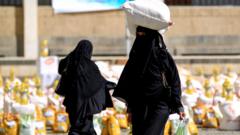The ongoing civil war in Yemen has made it increasingly dangerous for NGO workers, with recent arrests by Houthi rebels prompting many organizations to scale back operations, risking the welfare of millions in need of assistance.
Aid Workers in Yemen Face Harsh Crackdown Amid Humanitarian Crisis

Aid Workers in Yemen Face Harsh Crackdown Amid Humanitarian Crisis
Raids and arrests by Houthi rebels have left humanitarian workers fearful and operations hampered, exacerbating an already dire situation in Yemen.
In a country where nearly half the population relies on humanitarian aid, Yemen’s civil war has turned the situation for aid workers into a perilous reality. Hanaa, an employee at a US-funded NGO, arrived at work recently to find her office ransacked, with her boss arrested by Houthi rebels and their operations heavily scrutinized.
For many humanitarian workers, fear permeates their daily lives. Over recent months, a string of detentions, including 24 UN personnel, has created a chilling atmosphere. The case of a detained worker from the World Food Programme who tragically died in custody highlighted the extreme risks faced by those committed to aiding Yemeni civilians. Hanaa, alarmed at the escalating crackdowns, described a landscape where freedom of movement for aid workers has nearly collapsed.
The backdrop of this humanitarian crisis is the decade-long civil war, where Iranian-backed Houthi militants have seized control of large areas in Yemen, leading to a multifaceted humanitarian disaster. As conflicts intensified, Saudi-led airstrikes joined the fray, backed by logistical support from the US and UK, further complicating the circumstances for workers trying to deliver aid.
As Hanaa witnessed the deterioration of her workplace and later monitored the media's portrayal of US-funded NGOs as fronts for espionage, she felt the weight of public scrutiny drive her to leave her home. Her journey south left her traumatized; the emotional toll compounded by concerns over the future of US-funded projects following a re-designation of the Houthis as a terrorist group.
Legal aid for detainees remains uncertain, according to Yemeni lawyer Abdulaziz, who represents multiple detained aid workers. While recent changes allowed brief family communication, the situation remains murky regarding the health and treatment of detainees.
Simultaneously, aid from the United States Agency for International Development (USAID) has also been halted, which researchers at Human Rights Watch warn will have dire consequences for the already weakened humanitarian response in Yemen. The need is significant: the UN estimates that around 10 million children are in need of urgent support.
As families like Amal’s, a mother of nine living in a makeshift camp, face daily struggles for survival, the ramifications of these operational setbacks become stark. Amal conveyed the hopelessness that accompanies poverty and displacement, noting that without ongoing aid, her family might not survive.
The United Nations and humanitarian organizations are facing immense challenges as they attempt to navigate this dangerous landscape. UN envoy Hans Grundberg condemned the ongoing detentions, emphasizing that they not only violate human rights but also hinder essential aid distribution.
Despite the hesitations and fears surrounding their work, aid workers like Hanaa continue to strive for a better future for Yemen’s children. However, with increasing restrictions and diminishing resources, their ability to effect change is constantly threatened, leaving the humanitarian situation more precarious than ever.


















